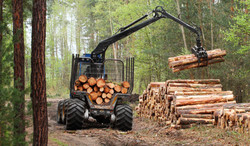Robots boosting competitive advantage of European timber industry
To keep up with strong Chinese and Indian competition in the manufacturing of wood panels, the industry must leave behind certain manual production processes. This means embracing automation on the timber sawmill shop floor. In line with this objective, the EU-funded HOL-I-WOOD PR (Holonic integration of cognition, communication and control for a wood patching robot) project aimed to design a robot and an accompanying scanner that fully automates the removal and repair process for wood panels. The robot instantly identifies and repairs all defects in real time thanks to data it receives from a high-resolution optical scanner. This scanner inspects large boards and panels and immediately detects all faults. The robot repairs each panel based on the information stored or retrieved. The wood products are then ready for inspection. This efficient, manageable and user-friendly robotic technology can repair up to 450 wood panels an hour, roughly the equivalent of 50 human operators. Project partners specified system requirements and all internal and external interfaces and environments. They defined the technical requirements, component architecture and integration framework. Investigation of effectiveness, determination of optimal equipment control and definition of constraints then followed. The team redesigned a robot eye to optimise image analysis and real-time imaging in smart cams, and integrated multi-sensory scanning technology to perform analyses. Project members developed the robot and related components such as the user interface, dialogue system and real-time control and communication network. The technology was successfully demonstrated at a glue lam factory. By introducing a highly automated and integrated robotic technology to mills and factories, HOL-I-WOOD PR has helped optimise production. Wood processing companies in Europe will be able to maintain their competitiveness and fend off their biggest competitors.
Keywords
Robots, timber industry, wood panels, holonic integration, wood patching robot, Multi-Sensor Scanning for Quality determination, wood defect recognition



